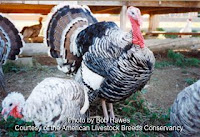While we are not doing much ground work now, it seems we are busier then ever. David finished fencing in the chicken coop pen and all that is left is to install the bottom wire on the fence (to keep animals out) and build the gate. We will also be installing a bottom wire on the fence around the turkey run, as well as placing rock around the turkey run fence.
For those of you that have been following the blog, we lost our Turkeys this past year. As the turkey's we originally chose (Broad-Breasted Bronze) did not reproduce naturally, David went back to the drawing board and conducted more research. As a result, we will be trying the Narragansett turkey next year. David could not find any heritage turkeys from the south, so we are settling on other characteristics.
 |
| Narragansett Turkey |
The Narragansett turkey is from the Narragansett Bay area of Rhode Island. These turkeys have traditionally been known for their calm disposition, good maternal abilities, early maturation, egg production, and excellent meat quality. They are listed as threatened by the American Livestock Breeds Conservancy. As turkeys must be purchased as straight runs, we have no control over the number of hens or toms. We will allow these turkeys to breed if nature is willing.
Baker Heritage Farms will be ordering 25 Wyandotte Silver Laced chickens (pullets - hens only) for delivery on or about March 4, 2013 so that they will be ready for release into the chicken coop in time for the turkeys to be delivered. We will be ordering 15 Narragansett turkeys (straight run - mixed) on or about May 13, to allow for raising them for butcher in time for the holidays (our plan for this year prior to our losses).
Meanwhile, we are actively planning our crops for 2013. We are still awaiting information that will allow us to determine if we will be planting a winter cover crop. This decision will be made by next week (we hope). We have made a list of the seeds we want to plant for next year and are now working on laying out our plots to determine how much seed we will need for each crop.
We are also looking at what equipment and tools we will need to be ready for planting. We will need to start some of the crops indoors for later transplant into the fields, so we are also looking at seed starting equipment and supplies. As we are trying to control costs, we will be setting up growing tables in our big barn instead of purchasing a green house.
We are continuing to learn from our research. In researching the various types of seed, supplies, tools, and equipment we will need, we have found that there is a very wide range of prices. If you are just starting out, we highly recommend that you spend time researching before buying anything. We are trying to reduce the number of suppliers we will be using for ease of ordering, availability of consultation (advice), and overall price. We have been able to narrow our list of vendors down, and hope to have our list ultimately reduced to two or three vendors.
Our next blog will include some of the tools we have decided to purchase, seeds we plan to order, and a prospective list of vendors that we hope to use. All of the vendors we have considered have been used by Kerr Center for Sustainable Agriculture, so we are fairly confident that they will be reliable vendors.
Until next time, blessings from Baker Heritage Farms.
No comments:
Post a Comment